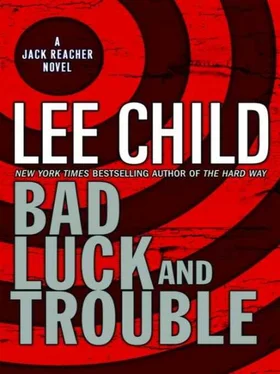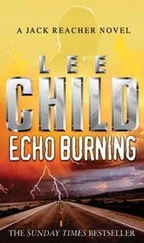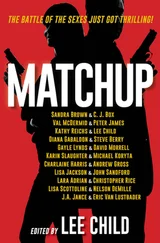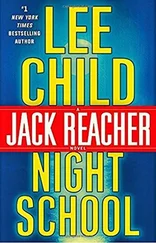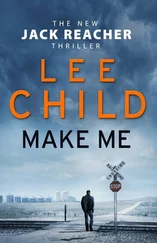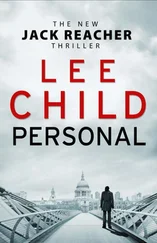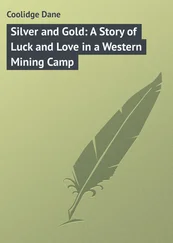“And then what?”
“He checks in at a Madison Avenue hotel.”
“And then?”
“He disappears. No further trace.”
“But?”
“We move on down the list. Alan Mason flies to Denver, Colorado. Takes a room at a downtown hotel.”
“And then?”
“We don’t know yet. We’re still checking.”
“But you think they’re all the same guy?”
“Obviously they’re all the same guy. The initials are a dead giveaway.”
Reacher said, “That makes me Chief Justice of the Supreme Court.”
“You sure act like it.”
“So who is he?”
“I have no idea. The INS inspector won’t remember him. Those Terminal Four guys see ten thousand faces a day. The New York hotel people won’t remember him. We haven’t spoken to Denver yet. But they probably won’t remember him, either.”
“Wasn’t he photographed at Immigration?”
“We’re working on getting the picture.”
Reacher went back to the first fax. The Homeland Security data. The advance passenger information.
“He’s British,” he said.
Mauney said, “Not necessarily. He had at least one British passport, that’s all.”
“So what’s your play?”
“We start a watch list of our own. Sooner or later Andrew MacBride or Anthony Matthews will show up somewhere. Then at least we’ll know where he’s going.”
“What do you want from us?”
“You ever heard any of those names?”
“No.”
“No friends anywhere with the initials A and M ?”
“Not that I recall.”
“Enemies?”
“Don’t think so.”
“Did Orozco know anyone with those initials?”
“I don’t know. I haven’t spoken to Orozco in ten years.”
“I was wrong,” Mauney said. “About the rope on his hands and feet. I had a guy take a look at it. It isn’t very common after all. It’s a sisal product from the Indian subcontinent.”
“Where would someone get it?”
“It’s not for sale anywhere in the United States. It would have to come in on whatever gets exported from there.”
“Which is what?”
“Rolled carpets, bales of unfinished cotton fabric, stuff like that.”
“Thanks for sharing.”
“No problem. I’m sorry for your loss.”
Mauney left and they went up to Dixon’s room. No real reason. They were still dead-ended. But they had to be somewhere. O’Donnell cleaned blood off his switchblade and checked over the captured Hardballers in his usual meticulous fashion. They had been manufactured by AMT not far away in Irwindale, California. They were fully loaded with jacketed.45s. They were in fine condition and fully operational. Clean, oiled, undamaged, which made it likely that they had been very recently stolen. Dope dealers were not usually careful with weapons. The Hardballers’ only limitations came from being faithful copies of a design that had been around since the year 1911. Magazine capacity was only seven rounds, which must have seemed more than OK in a world full of six-shooters, but which didn’t stack up very well against modern capacities of fifteen or more.
“Pieces of shit,” Neagley said.
“Better than throwing stones,” O’Donnell said.
“Too big for my hand,” Dixon said. “I like the Glock 19, personally.”
“I like anything that works,” Reacher said.
“The Glock holds seventeen rounds.”
“It only takes one per head. I’ve never had seventeen people after me all at once.”
“Could happen.”
The dark-haired forty-year-old calling himself Andrew MacBride was on the underground train inside the Denver airport. He had time to kill so he was riding it back and forth over and over again between the main terminal and Concourse C, which was the last stop. He was enjoying the jug-band music. He felt lightened, unburdened, and free. His luggage was now minimal. No more heavy suitcase. Just an overnight roll-on and a briefcase. The bill of lading was inside the briefcase, folded into a hardcover book. The padlock key was zipped into a secure pocket.
The man in the blue suit in the blue Chrysler sedan dialed his cell phone.
“They’re back in the hotel,” he said. “All four of them.”
“Are they getting close to us?” his boss asked.
“I have no way of telling.”
“Gut feeling?”
“Yes, I think they’re getting close.”
“OK, it’s time to take them down. Leave them there and come on in. We’ll make our move in a couple of hours.”
O’Donnell stood up and walked to Dixon’s window and asked, “What have we got?”
It was a routine question from the past. It had been a big part of the special unit’s standard operating procedure. Like an unbreakable habit. Reacher had always insisted on constant recaps. He had insisted on combing through accumulated information, restating it, testing it, re-examining it, looking at it from new angles in the light of what had come afterward. But this time nobody answered, except Dixon, who said, “All we’ve got is four dead friends.”
The room went quiet.
“Let’s get dinner,” Neagley said. “No point in the rest of us starving ourselves to death.”
Dinner . Reacher recalled the burger barn, twenty-four hours previously. Sunset Boulevard, the noise, the thick beef patties, the cold beer. The round table for four. The conversation. The way the center of attention had rotated freely between them all. Always one talker and three listeners, a shifting pyramid that had swung first one way and then another.
One talker, three listeners.
“Mistake,” he said.
Neagley said, “Eating is a mistake?”
“No, eat if you want to. But we’re making a mistake. A major conceptual error.”
“Where?”
“My fault entirely. I jumped to a false conclusion.”
“How?”
“Why can’t we find Franz’s client?”
“I don’t know.”
“Because Franz didn’t have a client. We made a mistake. His was the first body found, so we just went ahead and assumed this whole thing was about him. Like he had to have been the prime mover here. Like he was the talker and the other three were the listeners. But suppose he wasn’t the talker?”
“So who was?”
“We’ve been saying all along he wouldn’t have put himself on the line except for someone special. Someone he was obligated to somehow.”
“But that’s back to saying he was the prime mover. With a client we can’t find.”
“No, we’re imagining the hierarchy all wrong. It doesn’t necessarily go, first the client, then Franz, then the others helping Franz. I think Franz was actually lower down the pecking order. He wasn’t at the top of the tree. See what I mean? Suppose he was actually helping one of the others? Suppose he was a listener, not the talker? Suppose this whole thing is basically Orozco’s deal? For one of his clients? Or Sanchez’s? If they needed help, who were they going to call?”
“Franz and Swan.”
“Exactly. We’ve been wrong from the start. We need to reverse the paradigm. Suppose Franz got a panic call from Orozco or Sanchez? That’s certainly someone he regards as special. That’s someone he’s obligated to somehow. Not a client, but he can’t say no. He’s got to pitch in and help, no matter what Angela or Charlie think.”
Silence in the room.
Reacher said, “Orozco contacted Homeland Security. That’s difficult to do. And it’s the only really proactive thing we’ve seen so far. It’s more than Franz seems to have done.”
O’Donnell said, “Mauney’s people think Orozco was dead before Franz. That might be significant.”
“Yes,” Dixon said. “If this was Franz’s deal, why would he farm out the heavy-duty inquiries to Orozco? I imagine Franz was better equipped to handle them himself. That kind of proves the dynamic was flowing the other way, doesn’t it?”
Читать дальше
